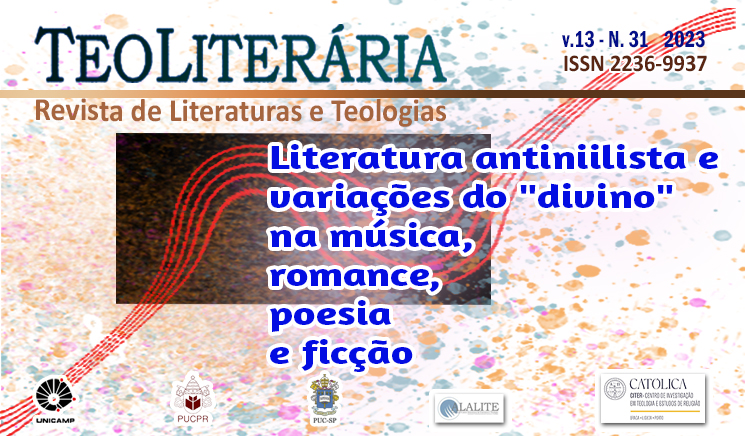A Presença da religiosidade em Augusto dos Anjos
DOI :
https://doi.org/10.23925/2236-9937.2023v31p191-209Mots-clés :
Augusto dos Anjos, poema, religiosidade, símbolos religiososRésumé
O presente artigo tem como proposta promover uma reflexão sobre a presença da religiosidade na obra de Augusto dos Anjos, elencando e analisando os elementos e os símbolos nela presentes que possam ser entendidos como de natureza religiosa. Para enriquecer a discussão, foram destacados da fortuna crítica do poeta trabalhos como o de Márcia Peters Sabino (2005), que discorre sobre a presença (ou não) da religiosidade na obra do poeta, defendendo que esse promoveu a desconstrução dos símbolos e temas religiosos, e o de Maria Olívia Garcia Ribeiro de Arruda (2009), que, ao discorrer sobre o poema A um carneiro morto, traz uma análise que o associa mais a um contexto histórico do que a uma temática religiosa. Por meio da análise parcial de alguns trechos de poemas citados por Sabino e da análise detalhada do poema A um carneiro morto, citado por Arruda, esse trabalho propõe uma versão de análise alternativa àquelas das referidas autoras.
Références
ALCIDES, Sérgio. Augusto dos Anjos e o Mito do Eu. In: FINAZZI-AGRÒ, Ettore; VECCHI, Roberto; AMOROSO, Maria Betânia (Orgs.). Travessias do Pós-Trágico: Os Dilemas de uma Leitura do Brasil. São Paulo: Unimarco Editora, 2006. p. 121-130.
ANJOS, Augusto dos. Toda Poesia de Augusto dos Anjos. 5 ed. Rio de Janeiro: José Olympio, 2016.
ARRUDA, Maria Olívia Garcia Ribeiro de. O lamento dos Oprimidos em Augusto dos Anjos. Tese (Doutorado em Teoria e História da Linguagem). Campinas: Universidade de Campinas, 2009.
GRIECO, Agripino. “Uni livro imortal”. In: Anjos, Augusto dos. Obra Completa. Rio de Janeiro, Nova Aguilar, 1996. p.81-89.
SABINO, Márcia Peters. A questão da Religiosidade em Augusto dos Anjos. Revista Letras & Letras, Uberlândia, v. 1, 2005. Disponível em: https://seer.ufu.br/index.php/letraseletras/article/view/25201/14017. Acesso em 15 jul. 2023.
Téléchargements
Publié-e
Comment citer
Numéro
Rubrique
Licence
© TEOLITERARIA - Revista de Literaturas e Teologias 2023

Cette œuvre est sous licence Creative Commons Attribution 4.0 International.
A TeoLiterária – Revista de Literaturas e Teologias é detentora dos direitos autorais de todos os artigos publicados por ela. A reprodução total dos textos em outras publicações, ou para qualquer outro fim, por quaisquer meios, requer autorização por escrito do editor. Reproduções parciais de artigos (resumo, abstract, mais de 500 palavras de texto, tabelas, figuras e outras ilustrações) deverão ter permissão por escrito do editor e dos autores.



